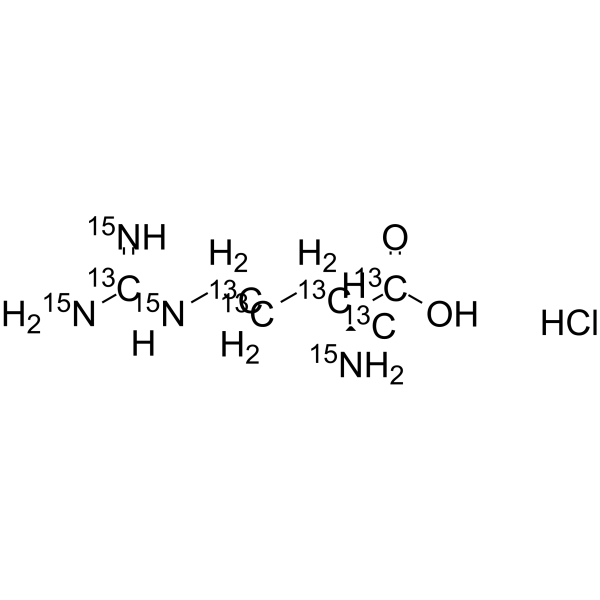L-Arginine-13C6,15N4 hydrochloride
Modify Date: 2025-08-27 11:32:25

L-Arginine-13C6,15N4 hydrochloride structure
|
Common Name | L-Arginine-13C6,15N4 hydrochloride | ||
|---|---|---|---|---|
| CAS Number | 202468-25-5 | Molecular Weight | 220.592 | |
| Density | N/A | Boiling Point | N/A | |
| Molecular Formula | 13C6H15Cl15N4O2 | Melting Point | N/A | |
| MSDS | N/A | Flash Point | N/A | |
Use of L-Arginine-13C6,15N4 hydrochlorideL-Arginine-13C6,15N4 ((S)-(+)-Arginine-13C6,15N4) hydrochloride is the 13C- and 15N-labeled L-Arginine hydrochloride. L-Arginine hydrochloride ((S)-(+)-Arginine hydrochloride) is the nitrogen donor for synthesis of nitric oxide, a potent vasodilator that is deficient during times of sickle cell crisis. |
| Name | L-Arginine:Hcl (13C,15N4) |
|---|---|
| Synonym | More Synonyms |
| Description | L-Arginine-13C6,15N4 ((S)-(+)-Arginine-13C6,15N4) hydrochloride is the 13C- and 15N-labeled L-Arginine hydrochloride. L-Arginine hydrochloride ((S)-(+)-Arginine hydrochloride) is the nitrogen donor for synthesis of nitric oxide, a potent vasodilator that is deficient during times of sickle cell crisis. |
|---|---|
| Related Catalog | |
| In Vitro | Stable heavy isotopes of hydrogen, carbon, and other elements have been incorporated into drug molecules, largely as tracers for quantitation during the drug development process. Deuteration has gained attention because of its potential to affect the pharmacokinetic and metabolic profiles of drugs[1]. |
| References |
| Molecular Formula | 13C6H15Cl15N4O2 |
|---|---|
| Molecular Weight | 220.592 |
| Exact Mass | 220.096619 |
| InChIKey | KWTQSFXGGICVPE-YAUSPDTOSA-N |
| SMILES | Cl.NC(N)=NCCCC(N)C(=O)O |
| Storage condition | 2-8°C |
| L-(C,N)Arginine hydrochloride (1:1) |
| L-Arginine-C-N, hydrochloride (1:1) |